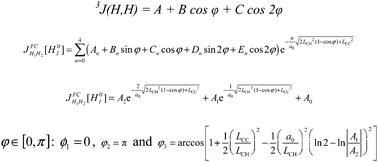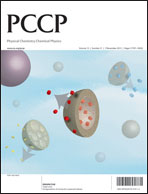Karplus dependence of spin–spin coupling constants revisited theoretically. Part 1: second-order double perturbation theory†
Abstract
A double perturbation theory (DPT) at the second order level of approximation formalism has been applied to examine the dihedral angle dependence of the Fermi-contact (FC) contribution to nuclear spin–spin coupling constants. The unperturbed wave function of the ground state in DPT was approximated by the Hartree–Fock Slater determinant, while the excited states were treated as the single excited determinants. An analytical expression relating the FC term of vicinal proton–proton spin–spin coupling constants across the aliphatic single carbon–carbon bond to the dihedral angle describing inner rotation around the C–C bond in the ten-electron ten-orbital moiety H–C–C–H has been derived and analyzed. In particular, it has been shown that extrema of 3J(H,H) are observed at φ = πn, n = 0, ±1, ±2,…, which provides a theoretical background of a well-known semiempirical Karplus equation.


 Please wait while we load your content...
Please wait while we load your content...